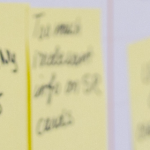The Yale LL.M.: WALL WARS
By Yale Blogger 2015 in LLM GUIDE Student Blog: Yale LLM 2015-2016 on Nov 16, 2015
With the long longed-for revival of “Star Wars” approaching (“Where in the world is Luke Skywalker?”) I should let you know that, in spite of the BUBBLE, prospective Yale law students should be prepared for a special kind of conflict: WALL WARS.
The WALL is an ancient institution at YLS, serving as its central communication platform. What once was an actual wall, where students would virtually pin their thoughts, invitations, questions and sorrows in paper form, the WALL has gone digital and turned into an email-run forum. Students now virtually virtually post their thoughts. Besides this change in form, the WALL’s substance remains.
This WALL then must be imagined as the forum that breeds Yale Law School as a community. Community building being a difficult, highly political enterprise, this does not go by without friction and tensions. The underlying tension regularly turns into heated "discussion", sometimes erupting into WALL WARS.
The content of WALL WARS is manifold: It may be the issue of Palestine. It may be the use of drones. It may be birthright citizenship and its partly racially motivated criticism. It may be colorblind emails about inconsiderate Halloween costumes and their implications for free expression and safe spaces.
(As it turns out, my failure at finding a Halloween costume might have been a good thing after all. Maybe my failing instincts and complete paralysis in the face of the costume-decision were a subtle hint towards Halloween being, at its heart, a very silly, unnecessary, potentially harmful exercise. Reflection confirms this hunch: Looking at its Roman predecessor, the Saturnalia, when slaves were allowed and encouraged to dress up as their masters for a couple of days, points us towards all kinds of Carnival being, at their very core, means of entrenching social norms and existing power structures. Limiting disorder to a couple of days and allowing its periodic ventilation essentially amounts to affirming the order for the rest of the time. By practicing disorder as disorder, order is affirmed. The supposed need to “get certain things out of the system”, often claimed by Carnival-apologetics to be a central function of these festivities, should make us skeptical: Why are these things in the system in the first place? And shouldn’t the system be different? – As you can see, I still haven’t come to terms with having failed at Halloween. This is my exercise in rationalization.)
Despite its manifold content, the shape of WALL WARS is one and the same: Inclusion through exclusion by declaration.
WALL WARS cannot be understood as reasoned argument. When the topic turns e.g. on Israel, people don’t actually argue about Israel’s politics. Instead, somebody will passive-aggressively declare, through the WALL, her or his support to the Palestinian cause, more or less openly implying some kind of Israeli imperialism or racism towards its Arab population. This ill-concealed suggestion will, of course, be detected and picked up by some other member of the Yale Law community who will, in turn, declare his or her allegiance to the Israeli cause, usually retorting with some other mildly passive-aggressive comment. This exchange then goes back and forth for a couple of times, allowing both sides to strengthen their respective group identity. In all of this, no argument is being made. Nobody tries to convince anybody of the falsity of her or his beliefs. It is an exercise in identity building with the vague hope that one’s own identity group will, in the long run, prevail. The code of the discussion is “in or out”, friend or foe.
The same dynamics – in their purest form - emerged in reaction to a lunch lecture hosted by Yale Law School’s enfant terrible, the right-wing Federalist Society, putting into question birthright citizenship on patently racist grounds. Shortly after the event, instead of denouncing and refuting the untenable argument, a WALL thread developed with the express goal of “condemning” the presentation and ostentatiously reaffirming the commitment to birthright citizenship and the fellow students with recent immigrant pasts.
(This is the sad fate awaiting the WALL if it continues its friend-foe discursive culture.)
The ensuing candystorm (GOOGLE tells me this is how one calls shitstorm’s benign sibling) of solidarity continued for several days and – taken together with other WALL WARS – left me in an even more confused state than what would seem appropriate for a meerkat in a meerkat’s haven. Before coming to Yale, I would never have expected any law school’s discursive culture to be so hostile to actual discussion and so keen on building close-knit communities in which everyone constantly affirms each other’s beliefs. This mindset, for me, is in strange discord with the intensively curious and intellectually challenging posture taken in most of Yale Law School’s classes. It is as if the student body, after being challenged in class, turns to the WALL in order to heal its wounds and create an even safer space. Students do so by declaring allegiance to the RIGHT and condemning the WRONG. The code is solidarity or exclusion. From an outsider’s perspective this is not agonism or adversary culture, it is the very antagonism that has been mutilating American politics since the advent of the Tea Party. These aren’t contests, these are WALL WARS.
For more on the LL.M. programs at Yale Law, please see the school’s profile on LLM GUIDE.
LLM News
LLM Articles
Why Tech Law is the Hot New LL.M. Focus in an AI Era
Nov 14, 2024
Schools are helping lawyers prepare for a fast-changing legal world impacted by AI and developing technology. Students can benefit from a cutting-edge curriculum and new job opportunities.
Connect with Top California Law Schools
Nov 07, 2024
The California Law LL.M. Consortium is giving prospective students in Milan and London the opportunity to meet school and admissions representatives. They will hear about top legal issues and learn about how a U.S. LL.M. can benefit their careers.
Leaping Back into Firm Life After an LL.M.
Nov 05, 2024
Leaving school behind can feel daunting but if a graduate understands the different expectations and is conscious of new technology, it can make returning to a firm that much easier.
Making the Most of Your LL.M.: Why Extracurricular Groups Matter
Oct 28, 2024
Activities outside class time can give students a more well-rounded experience during their degree. They can build crucial skills and expand a student's network to benefit their post-school life.













